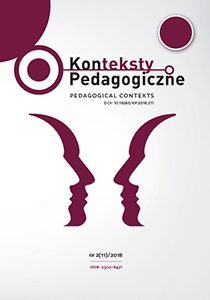Abstract
The author of the following article presents the problem of the place of modern information and communication technologies in the process of teach-ing, learning and upbringing. The views of various authors regarding cyber-com-petence of students, as well as the benefits and threats of computer games, have been discussed. Furthermore, the text also raises the issue of challenges related to cyberspace in the field of educational work.
References
Andrzejewska, A. (2013). Rola nauczyciela w ochronie dzieci i młodzieży przed zagro-żeniami cyberprzestrzeni. Rozprawy Społeczne, 2, 13–18.
Borawska- Kalbarczyk, K. (2017a). Technologie cyfrowe w edukacji – między immersją ucznia a indolencją szkoły. Konteksty Pedagogiczne, 1(8), 117–132.
Borawska-Kalbarczyk, K. (2017b). Wirtualne środowisko kształcenia w procesie wspie-rania motywacji do uczenia się. Konteksty Pedagogiczne, 2(9), 153–164.
Jabłońska, M.R. (2018). Człowiek w cyberprzestrzeni. Wprowadzenie do psychologii In-ternetu. Łódź: Wydawnictwo Uniwersytetu Łódzkiego.
Kałdon, B. (2016). Cyberprzestrzeń jako zagrożenie dla człowieka XXI wieku. Seminare, 2, 87–101.
Kołodzieczyk, W. & Polak, M. (2011). Jak będzie zmieniać się edukacja? Wyzwania dla polskiej szkoły i edukacji. Warszawa: Instytut Obywatelski.
Siemieniecki, B. (2001). Technologia informacyjna w polskiej szkole. Stan i zadania. Toruń: Adam Marszałek.
Spitzer, M. (2016). Cyberchoroby. Jak cyfrowe życie rujnuje nasze zdrowie, trans. M. Gu-zowska. Słupsk: Wydawnictwo Dobra Literatura.
Waluś, S. (2016). Współczesna rodzina wobec nowoczesnych. In: K. Pujer (ed.), Rodzi-na i szkoła wobec szans i zagrożeń społeczno-cywilizacyjnych (p. 43–54). Wrocław: Exante.
In accordance with the recommendation of the Ministry of Science and Higher Education, which aims to counteract the practice of “ghostwriting” and “guest authorship,” all authors submitting their text for publication should attach an author’s statement which declares the contribution of each of the authors to the article. The printed and signed statement should be delivered by mail or other means to editor-in-chief Joanna Skibska or sent in the form of a scan to the following e-mail address: redakcja@kontekstypedagogczne.pl. The authors will not receive remuneration for publishing their papers. The editors reserve the right to make minor editorial changes to the articles which will not affect the substance of the article. We encourage all authors to prepare their articles in accordance with the guidelines for manuscript preparation. Download pdf file.
Authors transfer all copyrights and grant the journal the right of first publication with the work simultaneously licensed under a Creative Commons Attribution License that allows others to share the work with acknowledgement of the work's authorship and initial publication in this journal. All authors agree to the publishing of their email addresses, affiliations and short bio statements with their articles during the submission process.

